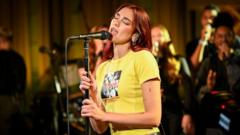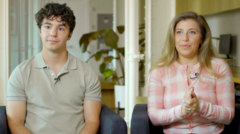Over 400 artists, including Elton John and Dua Lipa, have signed a letter to the UK Prime Minister advocating for updated copyright protections against the misuse of their works by artificial intelligence technologies. They called for transparency and licensing agreements to support the creative industry amid concerns that current proposals may undermine their artistic contributions.
British Artists Demand Copyright Reform to Protect Creative Work from AI

British Artists Demand Copyright Reform to Protect Creative Work from AI
High-profile musicians and writers urge the UK government for stricter copyright laws amidst fears of unauthorized AI use of their creations.
Elton John, Dua Lipa, and other luminaries from the British arts scene are rallying for stronger copyright protections in light of the rapid evolution of artificial intelligence (AI) technologies. The music and film stars have signed a letter addressed to Prime Minister Sir Keir Starmer, emphasizing the importance of safeguarding their creative output from potential exploitation by tech companies.
Joined by over 400 prominent figures, including Sir Ian McKellen, Florence Welch, and author Kazuo Ishiguro, the letter warns that without these protections, artists may unwittingly "give away" their work for AI development. The signatories argue that failure to enact these safeguards could jeopardize the UK's status as a global creative force.
The creative community's request specifically calls for an amendment to the Data (Use and Access) Bill. This amendment, spearheaded by Baroness Beeban Kidron, seeks to establish clear terms for developers about using copyrighted material to train AI models. The letter emphasizes the need for licensing regimes that allow human-created content to flourish alongside AI advancements.
The UK government has expressed its intention to support both the creative arts and AI sectors. A government spokesperson noted the ongoing consultations regarding measures that would benefit both industries without compromising creators’ rights. However, some critics argue that the proposed changes could hinder domestic growth and innovation while doing little to prevent foreign firms from exploiting UK content.
Among the signatories, Sir Paul McCartney has echoed concerns raised earlier this year about AI technologies stealing creativity. The fervent call for reform arrives amid rising anxiety surrounding the involvement of copyrighted material in AI system training, and the growing popularity of generative AI tools that can create content from text prompts.
Artists have protested previous government proposals, including a silent album released to convey their discontent about anticipated copyright changes. Amidst this backdrop, Ishiguro highlighted the injustice of altering traditional copyright laws to favor large corporations over individual creators, urging the government to reconsider their approach.
Despite a previous rejection of Kidron’s proposals in Parliament, she believes her amendment now presents a vital opportunity for establishing accountability within the AI landscape, promoting a transparent licensing market essential for nurturing creative voices.
As the government navigates feedback from its consultations, it has committed to a report assessing the implications of its proposed measures. The call from the arts community underscores the necessity of finding a balance that supports innovation while also protecting the intellectual ownership that fuels the UK's storied creative industry.





















